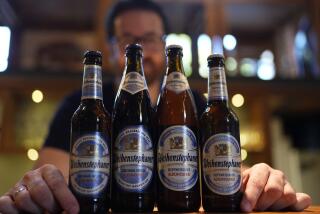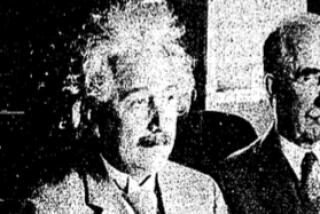We’ll Drink to That
- Share via
Which of the following is a purely fictitious event?
(A) Rocktoberfest
(B) Talktoberfest
(C) Spocktoberfest
(D) Bugtoberfest
Actually, all are real. Oktoberfest is so ingrained in the U.S. that we have twisted its very name like a pretzel for everything from concerts and talk radio to “Star Trek” parodies and conventions of VW enthusiasts.
And that’s without mentioning the innumerable Oktoberfests brewing in Southern California bars now, such poor cousins of the real thing. Just dress up some hot dogs with canned sauerkraut, put the Beck’s on tap, slap funny hats on the bartenders and you’re in business: Roll out the barrel, and while you’re at it, spin poor King Ludwig I of Bavaria another turn in his grave.
Then there are some places more Germanic, like Alpine Village in Torrance, Old World in Huntington Beach and the Phoenix Club in Anaheim. They have beer, food and music much closer to what’s available at the original Munich celebration, which began its 16-day run Saturday.
Yet no matter where you go in the L.A. area, the Oktoberfest spirit seems watered down. At the best celebrations, people still link arms and rock back and forth to the brass band’s oom-pah-pahing (naturally, Germans have precise words for this activity, schunkeln, and song-craft, Blasmusik). But participants are no longer allowed to dance on the tables, as they did some 20 years ago, thanks to liability laws and overzealous security guards. In short, the Teutonic tomfoolery is lacking.
It shouldn’t be that way. L.A., Orange and Ventura counties are home to about 1 million people of German ancestry, according to the latest census. There are still enough German speakers here to support two regional newspapers, a few hours of weekly radio programming and some churches. You’d think more people, stubborn in their heritage, would be protective of it.
Take Cincinnati. It claims to host the largest authentic Oktoberfest in the U.S., but it saw last weekend’s celebration marred by controversy, as the German-American Citizens League withdrew its sponsorship. The league said it did so, in part, because the festival is no longer German enough.
When you consider the event’s last three grand marshals, it’s hard to argue too much with that: Davy Jones of the Monkees, singer Tony Orlando and, this year, Verne Troyer, Mini-Me from “Austin Powers.”
Bavarian Partying
Even in Munich, Oktoberfest draws so many American tourists to its 14 beer tents that there are times it might seem as if you’ve remained stateside. Yet, chances are, the extremes of Bavarian partying will quickly reorient you. Beer is served in 1-liter steins, and 5 million to 6 million are downed annually, along with several hundred thousand chickens and about 80 oxen, among other creatures.
Such unabashed consumption carries a price, and many tourist guides advise leaving one or two hours before last call. As one of my female friends from Munich puts it: “It’s just not Oktoberfest unless it ends in fights breaking out and people puking all over the place.”
The festival has come a long way since it began Oct. 12, 1810, to celebrate the marriage of Ludwig to Princess Therese of Saxony-Hildburghausen. Back then, five days of festivities ended with a horse race. It was such a good time that Bavarians decided to celebrate the next year, and one thing led to another, so that now they start in September to fit in all the activities.
Of course, we can’t all jet off to Munich, which leaves us back where we started: here in some dark Southern California bar, limp pretzel in one hand and plastic cup of Bud in the other. But it doesn’t have to be that way.
The Red Lion Tavern in Silver Lake, perhaps the hippest German hangout around, is a step in the right direction, even if it has no special festivities. The waitresses there, one-third of whom are German, will tell you that every Friday and Saturday night are like Oktoberfest--and they’re right, except for the fact that there’s no brass band in the beer garden.
Bands From Germany
For that you must go to bigger venues like Alpine Village, Old World and the Phoenix Club. They import bands from Germany, and their beer and food selections range from limited to spectacular (see sidebar). The emcees typically speak in an admixture of English and Bavarian, overseeing events ranging from endurance beer stein holding to speed wood-sawing to those with a more lascivious bent, such as cow milking and bratwurst eating. And there’s the chicken dance, a tradition started in the 1970s involving much arm-flapping and rear-wiggling.
As for a truly authentic experience ... well, that’s open to debate, and one best waged in English at that. Try ordering food or drink auf deutsch and you could very well get a stare resembling bitter-beer face (or a response en espanol). A better bet for conversation is one of the regular attendees, usually older gentlemen in lederhosen or ladies in dirndl, though they too tend to speak the Germanglish of the emcees.
It’s yet another sign of how Oktoberfest has meshed with U.S. culture. Depending on your viewpoint, it’s a loss of German identity or a victory of the melting pot. Either way, to drown your sorrows or toast the American way, it’s worth raising a glass and saying, “Cheers!” ... er, wait ... “Prost!”
More to Read
Sign up for The Wild
We’ll help you find the best places to hike, bike and run, as well as the perfect silent spots for meditation and yoga.
You may occasionally receive promotional content from the Los Angeles Times.






